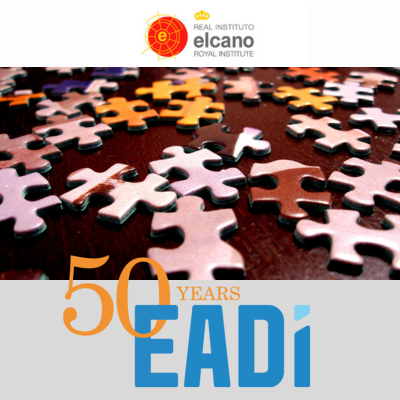Development Studies and Policy Engagement: Building the Missing Link?, Madrid, 26 April 2024
Public Event 11.30-13.00
11.30-13.00 CEST, Asociación de la Prensa de Madrid, Calle Claudio Coello, 98, Madrid
Background
While policymakers, practitioners and academics alike are dedicating efforts towards achieving global sustainable development – currently largely embodied in the formulationof the 2030 Agenda –, an important and implicit (yet often sidelined) conceptual question is what is it that these efforts are aiming to do when they are put at the service of ‘development’. There are inevitable underlying assumptions concerning what desirable and attainable ‘development’ constitutes, which determine which actions or decisions are taken, albeit not explicitly.
Indeed, several different conceptualisations of ‘development’ – or schools of thought – can be identified, both in the rationales behind development-related political agendas and in the corresponding academic debates (see ‘related materials’ below). These different accounts of ‘development’ can coexist, overlap and/or even compete with each other to different extents. In turn, this existence of multiple schools of thought within Development Studies can impact development-related policy- and decision-making, and vice versa. There are further different views on how researchers should engage with thepolitics inherent in policy processes.
Objective
The goal of this public panel is to explore this nexus between the academic activity within the scholarly field of Development Studies and its engagement with policy processes and decision-making. To that end, this session will begin by identifying the schools of thought that currently make up this area and different ways of thinking about engaging with policy processes. Linking this to the assumptions and preferences that underly political decision-making will then shed light onto whether, the extent to which and how this research-and-practice link takes different manifestations. For some this will help understand how evidence-informed decision-making can be ensured in order for policymaking to better respond to evolving and complex development-related realities and needs. For others it will be about a better sense of understanding of how/why/when and what kind of evidence is likely to gain traction in policy processes Format, audience and agenda
The public event will be held in English and it will have a duration of 60-70 minutes. The target audience will include policymakers, political parties’ representatives, researchers from the academic and think tank worlds, civil society and other stakeholders, like the media, the private sector and graduate and post-graduate students.
Agenda
Welcoming remarks: Charles Powell, Director, Elcano Royal Institute | @CharlesTPowell.
Panellists:
- Megan Naidoo, Predoctoral Fellow, ISGlobal (online) | @ISGLOBALorg (online).
- Martín Rivero, Coordinator of Social Cohesion and South-South Cooperation Area, SEGIB | @SEGIBdigital.
- Andy Sumner, Professor, King’s College London; President, EADI | @andypsumner.
- Érika Rodríguez Pinzón, Director, Fundación Carolina | @emaropi.
Moderated by: Iliana Olivié, Senior Analyst, Elcano Royal Institute; Vice-President, EADI; Director, European Think Tanks Group | @iolivie.
– The event will be held in English without simultaneous translation.
– In-person event. Please send RSVP to actividades(at)rielcano.org.


